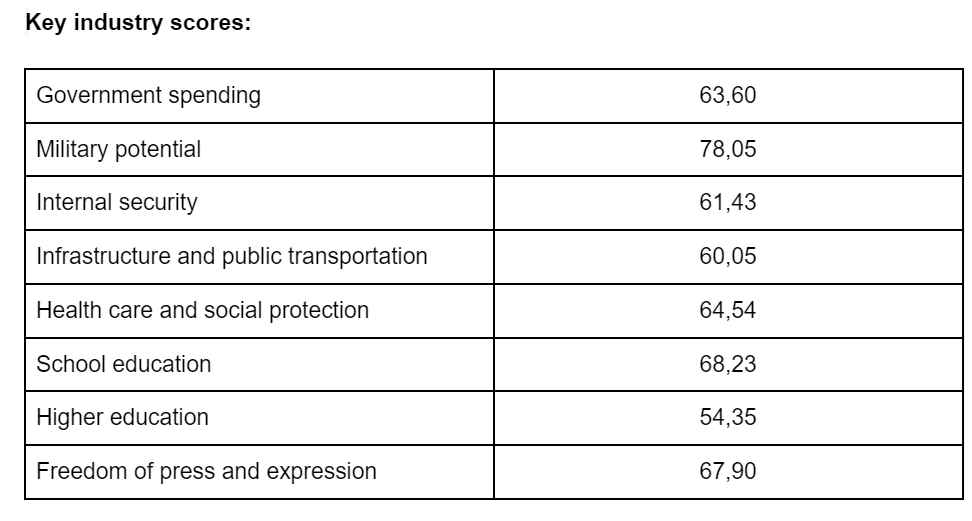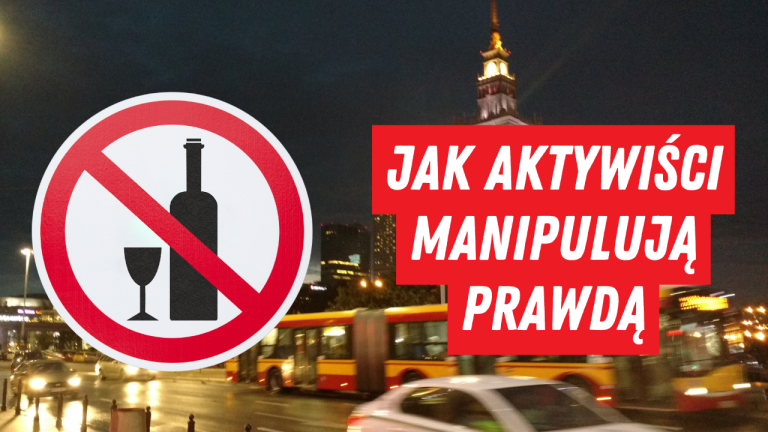In the overall Wealth Nations index ranking for 2024 by The Warsaw Enterprise Institute, Ukraine took the last 40th place.

Economy and public spending indicators
Ukraine’s GDP per capita is USD 6245.19, the lowest among the sample of countries assessed in the index. Government final expenditures account for 24.21% of GDP, which indicates the share of the economy’s output that is consumed by government spending. In terms of public spending, Ukraine received 63.60 and ranked 40th.
Nowadays, considering the realities of the war, public spending is many times higher, and in 2023 alone, Ukraine’s state budget expenditures almost doubled its revenues. The deficit is covered by external grant revenues and borrowings. Therefore, it is not surprising that in the years to come due to a significant increase in the state budget deficit, it will be inevitable that public debt service expenditures will increase, and on the other hand, the search for sources of external financing and possible debt restructuring will continue.
What can be done to improve? First and foremost, we should start with a more reasinable approach to our own expenditures. The state policy on social security should be reviewed, and steps towards the introduction of funded pensions should be continued. To abandon the subsidized tariff policy, which, according to experts, causes losses to the state budget of about UAH 100 billion a year due to artificially maintained tariffs. It is necessary to introduce market prices for gas, electricity, water, etc., with appropriate mechanisms for providing targeted subsidies to citizens who really need them. Some steps are being taken in this direction, such as the recent increase in electricity tariffs, and this will improve the situation to some extent, but not much, because the price set by the government is almost twice as low as the market price. Finally, to improve the fight against smuggling and shadow schemes by strengthening institutions such as the Bureau for Economic Security, which will help to raise additional funds that can be used for the army and increase necessary expenditures in other areas. Another appropriate step would be to expand the tax base by creating conditions (reform of the State Fiscal Service, simplification of tax administration, abandonment of the principle of permanent taxpayer guilt (when it is less profitable to be in the “shadow” than to work honestly).
Also, to abandon inappropriate populist ideas that are difficult to administer and burdensome for the state budget, especially in the context of a constant deficit, when it is proposed to increase taxes. Focus on increasing the role of the private sector in the economy and reducing bureaucratic obstacles. On the other hand, continued external assistance from partners, as well as good debt restructuring terms, will help the country stay afloat during the war and in the next few years after its potential end.
Infrastructure
Ukraine received one of the lowest scores for infrastructure among all countries – 60.05. On the one hand, this demonstrates the moderate adequacy of the main infrastructure elements. But on the other hand, we should not forget about such factors as the high level of deterioration of the utility and transport infrastructure in settlements, the need for timely overhaul of the road surface, and the loss of energy, utility, and housing infrastructure due to missile and drone attacks by Russia. Therefore, given the military realities and the redistribution of funds previously allocated to these areas towards military capabilities, it is worth considering that the situation with infrastructure will deteriorate with each year of the war.
It is necessary to allocate resources efficiently and, on the other hand, to prioritize spending on basic infrastructure, healthcare, education, etc. The emphasis should not be on rebuilding, but on modernizing and building more modern infrastructure that was damaged by Russia’s attacks. The reconstruction should be carried out according to modern standards and taking into account Ukrainian realities, especially critical infrastructure, including energy facilities, medical institutions, housing infrastructure, etc. In particular, when it comes to their restoration or construction from scratch, military security risks should be taken into account, and potential international partnerships and funding from global financial institutions can help with these projects.
Military potential
The score for Ukraine’s military potential is 78.05, which is quite high among other countries. This is, on the one hand, a necessity in times of war, but also the result of Ukrainian actions in this direction. Ukraine’s military capabilities are being strengthened by financial and material support from Western allies. The largest recipients are Germany and the United States. But it is also worth noting Ukraine’s progress in developing its own military-industrial complex, especially with regard to drones, the development of its missile program, and weapons production. The production of drones is a unique case of Ukraine, where an innovative industry with a strong demand from the military has developed without strong government regulation. As for arms production, several countries, including the UK, Germany, and Turkey, are already planning to build joint arms production plants in Ukraine. These factors, as well as the permanent threat from the Russian Federation, will contribute to the further development of the Ukrainian military-industrial complex as one of the most capable and powerful in the world.
We can conclude that among all the areas of the index, this is the most promising for Ukraine. And the main tips for improvement are investments in modern military technology and training programs, with the help of international military assistance and partnerships. Further investing in the capacity to produce and improve drones and unmanned aerial vehicles. In addition, reducing the level of bureaucratization of the army by implementing digitalization processes, etc. And of course, the ultimate goal is eventual NATO membership, but this requires further integration of the Ukrainian army in line with NATO standards in all respects.
Internal security
Considering the shift in budget spending priorities toward military capabilities and defense, the internal security score of 61.43 is one of the lowest among the index countries. However, it is worth noting that Ukraine reflects efficiency in maintaining law and order, with such notable components as security spending and public perception indicators. Although for obvious reasons, the level of security in the country can be questioned due to the terrorist actions of the Russian Federation. However, the main bodies continue to function and fulfill their responsibilities, and the crime rate in the country has decreased since 2022.
What should we work on next? Continuing to reform law enforcement agencies. In particular, the most noticeable reform is needed in the Security Service of Ukraine, which should focus on anti-terrorism and counterintelligence functions rather than economic issues.
Healthcare
With a score of 64.54, Ukraine’s healthcare system ranked among the lowest in the index. Although Ukraine has shown development efforts in healthcare and medical infrastructure even in the face of war, this is not enough. The main factor that distinguishes the Ukrainian healthcare sector from the EU in a better light is the accessibility of medical services. But on the other hand, there are many cases in Ukraine where people pay for treatment out of their own pockets, despite the declaration of free healthcare. Medical reform, autonomization of healthcare institutions and the creation of the National Healthcare Service of Ukraine have improved the situation. Private hospitals also have great potential in Ukraine.
What to work on next? Healthcare reform, taking into account the factors of population aging, migration of a large number of citizens (i.e., the gender and age structure of the population will change in the future, with fewer young citizens and more old ones), small number of staff in hospitals, etc. In other words, hospitals need to be re-profiled to meet new needs, i.e., to provide rehabilitation services, long-term care, and expand the role of primary healthcare facilities so that a conditional family doctor can do more interventions at the primary level, and then hospitals will deal only with specialized cases and have less workload. And also on the general emphasis on disease prevention, timely medical examinations, etc. since the survival rate after a stroke/heart attack and the survival rate after various types of cancer are much worse in Ukraine than in the EU countries in particular.
Education
Primary and secondary education scored 68.23. Higher university education received a score of 54.35, which emphasizes the need for reform and improvement of academic results at the higher education level.
As for school education, this is a continuation of the New Ukrainian School reform. The main thing is that every step should be taken to return to offline education. The level of security during the war is important in the current situation, schools should be provided with shelters. On the other hand, the level of distance learning should be improved as much as possible.
Focusing on improving higher education by revising funding mechanisms, including scholarships for students. Great steps are being taken to ensure that “money follows the student”. Reducing the number of higher education institutions, consolidating them and increasing their competitiveness. Reform of vocational education institutions, because in the future Ukraine will need people with high-quality knowledge and specialization in construction, etc. As for the master’s and postgraduate programs, it is about expanding research opportunities for young scientists and teachers and promoting international cooperation. Notable steps are also being taken in this direction, including the fact that in June of this year, the Verkhovna Rada passed a law that reduces the teaching load of teachers and gives them more opportunities and time for research, development, innovation, and professional growth.
Freedom of information and expression
Ukraine has the lowest score for freedom of the press, expression and assembly at 67.90. On the one hand, the full-scale invasion by the Russian Federation in 2022 changed the realities of the Ukrainian media landscape and civil liberties, and most media outlets have accepted these realities, self-censoring media outlets, restraining criticism of the government, the military, etc. However, recently, there have been more and more cases of restrictions on the work of or pressure on the media, which do not meet the needs of wartime. In particular, it is worth mentioning the joint statement of the G7 ambassadors who spoke in support of press freedom in Ukraine in January. And the latest scandal with the “dark web”, where the Presidential Office tried to influence the country’s oldest news agency, Ukrinform. As well as the continuation of the telethon created after the start of Russia’s full-scale invasion, which raises more and more questions about its work and which functions more as a state-controlled broadcasting rather than an objective source of information.
What to do to improve? The realities of war should be taken into account, and it is clear that the information space should be controlled to a certain extent. However, this is not about protecting someone’s personal interests, preventing necessary criticism, conducting corruption investigations, etc. We also propose to close the telethon and stop funding it, which this year is allocated half a billion UAH ($123 million). We consider this an irrational expenditure, because today the telethon’s journalists violate media standards, and it has fulfilled its function at the beginning of the full-scale invasion.
Conclusion
Today, Ukraine needs not only to survive the war, but also to try to improve its performance for the post-war future. We must perceive the war not only as a threat to our existence, but also as an opportunity to implement radical market reforms and make difficult and unpopular but important decisions. The Institute for Economic Leadership is convinced that the first priority should be given to the rational allocation of resources, ensuring the rule of law to attract investment and facilitate the activities of small and medium-sized businesses.
By focusing on strategic investments in key sectors and strengthening resilience, Ukraine can address its immediate challenges and create a foundation for long-term growth and stability.





